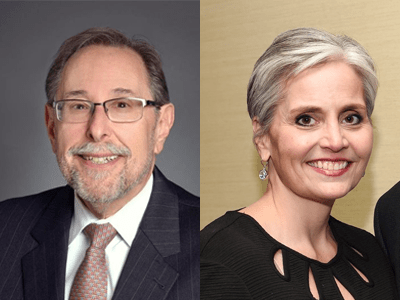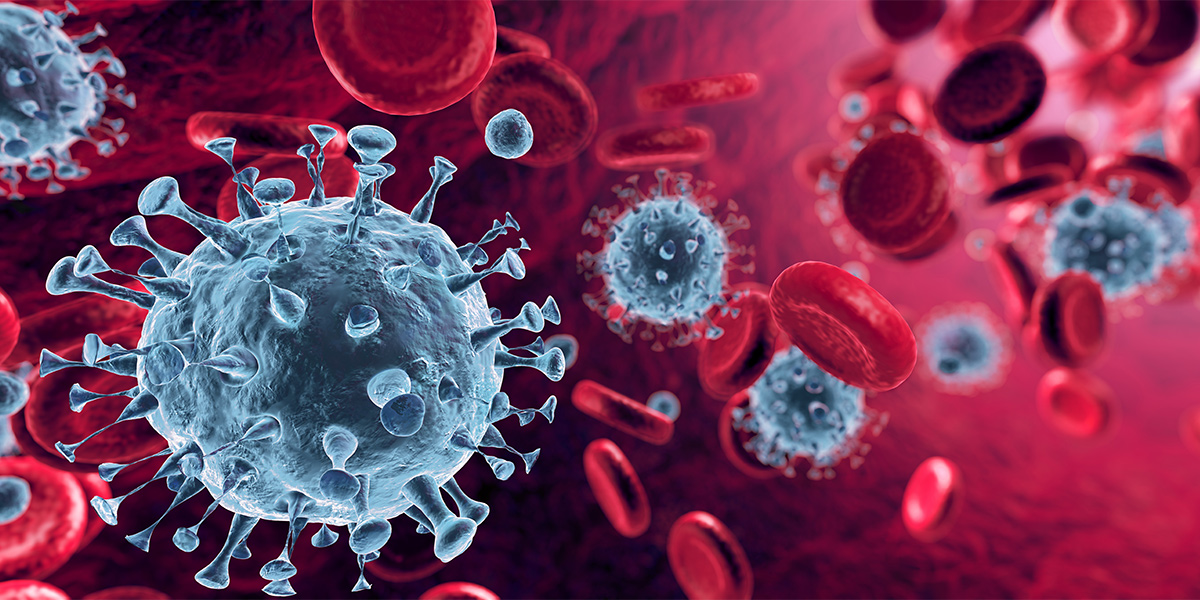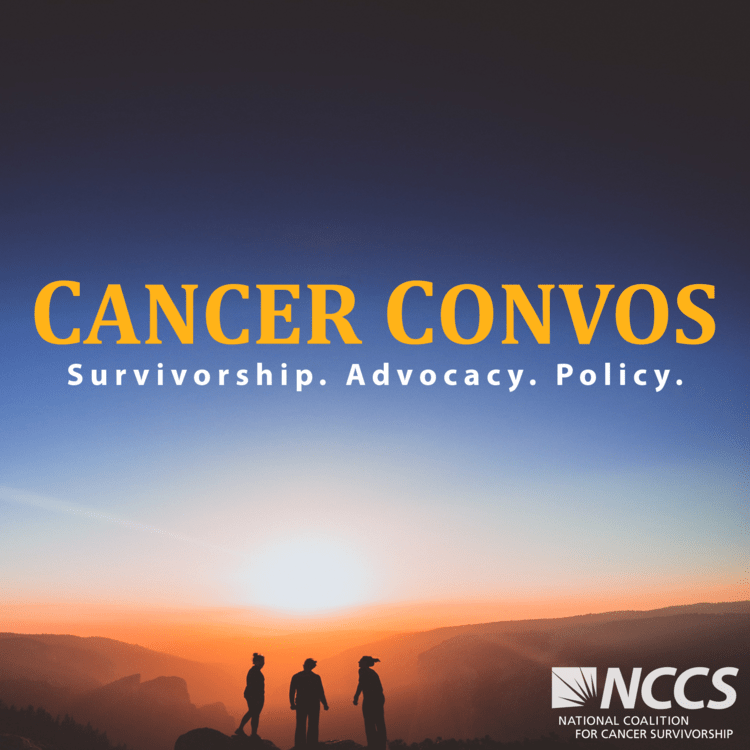Coronavirus and Cancer Resources for Survivors
NCCS has heard from many survivors who feel uniquely vulnerable due to their history of cancer treatments. And we have heard from people currently in treatment, who are worried about delays in care and navigating a stressed health care system.
We’re partnering and consulting with several cancer organizations and experts to address the questions and concerns survivors have shared. Please bookmark this page, as it will be updated frequently.
Frequently Asked Clinical Questions

Richard Schilsky, MD, FACP, FSCT, FASCO, and NCCS CEO Shelley Fuld Nasso
Click the link below to find answers to cancer survivors’ frequently asked clinical questions about COVID-19 from ASCO Chief Medical Officer and Executive Vice President Dr. Richard Schilsky.
We will continue sharing survivors’ clinical questions with ASCO, so if you have questions that are NOT answered here, please let us know.
 NCCS Podcast Hosts Health Care Experts Who Address Coronavirus’ Impact on Cancer Survivors
NCCS Podcast Hosts Health Care Experts Who Address Coronavirus’ Impact on Cancer Survivors
Listen to NCCS’ podcast, Cancer Convos, for more insights on COVID-19 and its impact on cancer patients and survivors. Subscribe to Cancer Convos on Apple Podcasts or your favorite podcast app.
How Survivors Can Cope With the Anxiety of COVID-19
Answered by L. Imani Price, PhD.
Dr. L. Imani Price is a licensed psychologist at Women’s InnerFitness and Wellness Center and serves as the Vice Chair of the Board of Directors at Breast Care for Washington, D.C.
Dr. Price suggests this expert advice:
Many survivors are experiencing stress, anxiety, and PTSD from the new expectations and restrictions resulting from the COVID-19 pandemic. These uncertain times can lead to feelings of helplessness and a lack of control over one’s life. This may trigger thoughts of stressful events of the past with worries about one’s health or that of loved ones.
Although experiencing some levels of anxiety and fear can be expected, we do have some control over our lives, despite the global restrictions from the pandemic.
While learning to live indoors:
- Develop a routine or schedule for your time, which includes the time you will wake up, time for movement/exercise, regular check-ins with friends, and regular family activities. Having a schedule can help center your emotions and give you a sense of control over your life.
- Take a breath. Deep breathing helps reduce stress in the body, reduces muscle tension, and calms the mind. It also increases the flow of oxygen to the brain, which helps with clarity, memory, and wellbeing. You can use DVDs or apps for exercising, find free breathing or meditation apps (Insight Timer or Calm) for techniques, or walk around your home or yard and climb stairs for movement.
- Stay in touch with the people you love with virtual communication and telephone calls. Use your time to start a daily conference or virtual call through a free conference or virtual call company with friends for a book club; Bible Study; prayer; or start a recipe exchange club where members alternate bringing new recipes to the group, cook it at the same time, and share the outcomes.
- Start a new hobby or learn a new skill. Embrace your creativity to help with mental acuity, expression, and entertainment. Let your creative self shine with these few suggestions and anything else your thoughts will lead you to do.
Food Assistance Program for Cancer Patients
![]() Team Rubicon, in collaboration with Patient Advocate Foundation (PAF) and funded by the Bristol Myers Squibb Foundation, will provide assistance to immunocompromised patients living with cancer, whose ability to access or afford food and other nutritional needs are at risk due to the COVID-19 pandemic.
Team Rubicon, in collaboration with Patient Advocate Foundation (PAF) and funded by the Bristol Myers Squibb Foundation, will provide assistance to immunocompromised patients living with cancer, whose ability to access or afford food and other nutritional needs are at risk due to the COVID-19 pandemic.
Eligible patients, their caregivers or care team members can request complimentary delivery of food and other critical supplies directly to their place of residence.
Patients with an identified financial need will be able to apply for a one-time grant of $500 to help pay for food and nutritional needs including groceries, food delivery or pick up and medically-tailored meals.
Apply Now at teamrubiconusa.org »
Helpline for Cancer Support
The Cancer Support Community (CSC) Cancer Support Helpline is staffed by counselors and resource specialists who have extensive years of experience helping people affected by cancer. Counselors and resource specialists can be reached by phone at 1-888-793-9355 or live chat from Monday through Friday, 9:00 a.m. – 9:00 p.m. ET, and Saturday and Sunday from 9:00 a.m. – 5:00 p.m. ET.
Resources About Loss of Health Coverage
This blog on COVID-19 by Karen Pollitz at Kaiser Family Foundation outlines what you can do about losing health coverage during this crisis.
For information about transitioning from job based coverage to other forms of coverage (including Medicaid and COBRA), see these resources:
- Health coverage options if you’re unemployed
- Losing Job-based Coverage
- Medicaid & CHIP coverage
- COBRA coverage and the Marketplace
- COBRA Continuation Coverage Questions and Answers
- Complex Case Scenarios – Preventing Gaps in Health Care Coverage Mini-Series: Transitioning from Employer-Sponsored Coverage to Other Health Coverage – June 5, 2015 (slides)
For information on Special Enrollment Periods, see here:
For updated guidance on grace periods for binder and premium payments see here:
Additional Resources
- “Coronavirus: What Cancer Patients Need to Know”
Fred Hutchinson Cancer Research Center - “Coronavirus: What People with Cancer Should Know”
National Cancer Institute - “Coronavirus 2019: What People With Cancer Need to Know”
American Society of Clinical Oncology’s (ASCO) Cancer.Net - ASCO – Coronavirus Resources
ASCO.org - “Coronavirus Disease 2019 (COVID-19) in the U.S.”
Centers for Disease Control and Prevention (CDC)
More Resources to Come!
We will soon be addressing how NCCS is advocating for telework, provisions in the Coronavirus Relief Bill that can help survivors, as well as how to get the exercise and nutrition survivors need while practicing social distancing.
Bookmark this page for more information!
Questions About Coronavirus?
NCCS is seeking answers from public health experts on the coronavirus and its impact on cancer patients and survivors. Please contact us at www.canceradvocacy.org/contact with any questions or concerns you have and what data would be helpful to you as we gather this information.

 NCCS Podcast Hosts Health Care Experts Who Address Coronavirus’ Impact on Cancer Survivors
NCCS Podcast Hosts Health Care Experts Who Address Coronavirus’ Impact on Cancer Survivors

